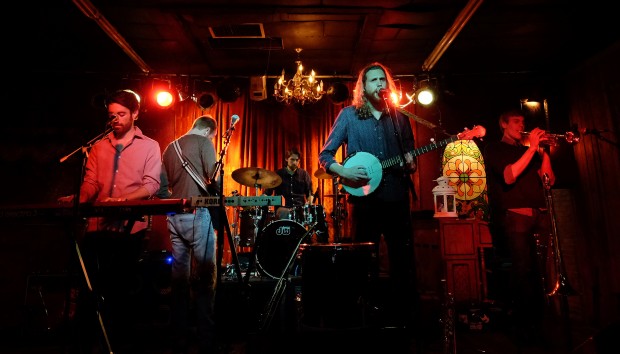Growing up in Utah’s Salt Lake Valley, songwriter Rob LeCheminant found himself inspired by the natural wonders surrounding him.
“Having been so close to areas like Canyonlands, Arches, the Grand Canyon, etcetera, has definitely affected my focus on sound and lyrics,” says the man whose most recent record, Giant, which he recorded under the moniker, L’Anarchiste, includes songs titled “Wolves,” “Nautilus” and “Sparrows.”
“I love nature metaphors or even literally writing about nature, and that’s a direct result of being fortunate enough to have grown up spending lots of time in those areas,” he says. In school he was exposed to classical and jazz music and took up the trumpet. He dreamed of becoming a soundtrack composer, then found he enjoyed writing folk and rock songs as well. All these influences and affinities combine to form the rich, eclectic tapestry of sound that is Giant.
Befitting his soundtrack aspirations, there is a cinematic quality to the new album. The intricate songs on Giant are epic in scope, with densely layered textures. LeCheminant, on vocals, guitar, trumpet and banjo (among other instruments), is joined by Alex Gilvarry on bass and keyboards; Bryan Hull on guitars and keyboards; Richie Gailey, on drums and percussion; and Devon Wooley on trombone, trumpet, melodica and keyboards. The resulting blend is an unusual mix of traditional instruments and modern sensibilities, with songs offering the listener unexpected twists and surprising tangents, synthesizers and autotune co-existing with banjos and horns.
The album’s title is shared by one of the tracks, but LeCheminant says there’s more to it than that. “I like to think of the title Giant as referring to the concept of small things—be it actions, events, ideas—having the potential to have great effect, if that makes any sense,” he says.
One of the album’s highlights is “Wolves,” which begins as a delicate, folky tune, tosses in some unanticipated auto-tuned vocals, then becomes lively and colorful, with syncopated percussion and a triumphant horn line.
“While I was writing it, the music went in a direction that I absolutely did not expect, but I love how it turned out,” he says. “I always thought it was going to be a slow, quiet song, but as I was writing, I just followed my gut instinct and that ’70s-western-inspired ending was what happened, which was super-fun to record.”
The words deal with fear of the unknown, and the struggle for honest and genuine communication. “The lyrics are about my inability to say what’s truly on my mind and how difficult it is to say to the people who matter the most to me,” he says. Those people include his wife, a kindergarten teacher with whom he lives on a Navajo reservation.
Another song, “Gamelan,” addresses the importance of human connection, with lyrics written at a time when LeCheminant was confused about his life’s direction. “I was so dissatisfied with my job, with schooling, and really feeling stopped in my progress, so I sat down and started writing a poem in the way that I knew best,” he says. “It was actually a song I sat on for years until the lyrics happened and I suddenly knew what to do with it.”
The haunting “Sparrows” sounds like an old-time Appalachian murder ballad crossing paths with a disco beat, reminiscent of the Talking Heads album, Remain in Light.
L’Anarchiste’s big, orchestral sound also begs comparisons to Arcade Fire, but LeCheminant says it is Sufjan Stevens he would most like to collaborate or share a bill with. “He has affected me and my writing more than any other artist, I’d say.”
Though on the recording the vocal tracks are at times distant—another layer in the ambient soundscape—and the overall tone can come across as polished and cool, LeCheminant says audiences can expect “a surprising amount of emotion” from L’Anarchiste’s live performance. “We also balance a juggling act of instruments that we all switch around on,” he says, “which makes it fun and interesting for us and hopefully the audience as well.”
L’Anarchiste plays BackBar SoFa on Nov. 7 at 7pm.



